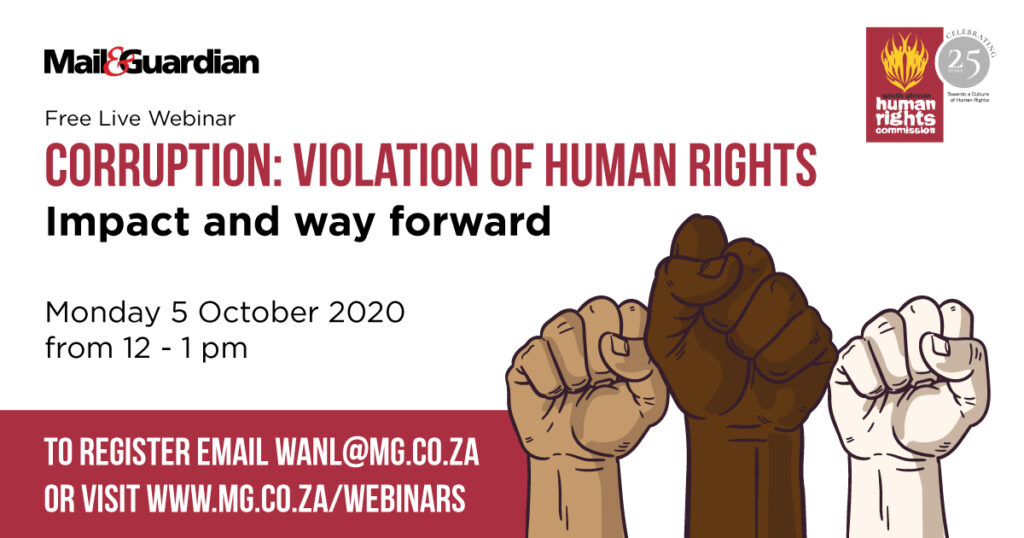Buang Jones is the Gauteng Provincial Head for SAHRC
This Mail & Guardian webinar was sponsored by the South African Human Rights Commission (SAHRC). Speakers included Buang Jones, Gauteng Provincial Head for the SAHRC; Karam Singh, Head of Legal and Investigations at Corruption Watch; and Charné Tracey from Lawyers for Human Rights. The webinar was moderated by Gushwell Brooks, Communications Co-ordinator from the SAHRC.
Gushwell Brooks introduced the speakers and the theme, then the speakers made their opening remarks.
Corruption is very much in the headlines at the moment, with the Hawks swooping, said Buang Jones, and how corruption impacts the poor is the focus of the SAHRC. It perpetuates alarming levels of inequality in South Africa, and it has reached “epic proportions”. Charné Tracey said fighting corruption will have to be a joint effort, not just for NGOs alone. Karam Singh said the challenge of fighting corruption is a big one, as our Constitution sets a very high bar. There is a legacy of inequality from colonial past, which hasn’t changed since democracy came to South Africa, and there’s also an accountability deficit.
 Karam Singh is the Head of Legal and Investigations at Corruption Watch
Karam Singh is the Head of Legal and Investigations at Corruption WatchThe SAHRC is a 25-year-old Chapter Nine institution, said Brooks, and he asked why corruption is an issue that it is worth addressing. Jones said it is because the protection of human rights is the business of the commission, and poor decisions and corruption affect the poor the most, “so we cannot keep quiet”. Accountability and transparency are encouraged by the SAHRC —these standards are encouraged among not only government bodies, but also private companies.
Civil society has an important role to play, as the poor are affected by systemic corrupt state services, such as Home Affairs. Among the major roles it can play regards litigation, and sharing information with the media, so the perception that “corruption is inevitable” can be changed.
To create good governance and integrity we need to focus on appointments, as our leaders frequently tend to get captured. The way we confront corruption is disjointed, so we “need to take a step back”, and possibly create an independent state organ that cannot be captured. Perhaps the public protector act should be reviewed, as an alternative to establishing an independent anti-corruption body in government. Another possible course of action is to think strongly about amalgamating all the Chapter Nine Institutions, said Singh.
This is a group of organisations established in terms of Chapter Nine of the South African Constitution to guard democracy. They are: the Public Protector, the (SAHRC), the Commission for the Promotion and Protection of the Rights of Cultural, Religious and Linguistic Communities, the Commission for Gender Equality, the Auditor-General, the Independent Electoral Commission and an Independent Authority to Regulate Broadcasting.
A poll conducted in the webinar on what sector is most affected by corruption initially revealed that the audience thought that it was housing; later this changed to lack of access to justice. Generally there was quite an even split on this; everything, including education, is affected by corruption.
 Charné Tracey is from Lawyers for Human Rights
Charné Tracey is from Lawyers for Human RightsOne issue raised by the audience was that of whistle-blowers, and how they often are fired or isolated when they speak up. Legislation regarding whistle-blowing must be rigorously addressed and changed for their greater protection. We need to be concise and consistent on this issue: when reporting corruption, one should not feel threatened in any way.
What concrete actions can be taken to address corruption? The SAHRC is empowered to conduct investigations concerning human right infringements; it is also mandated to advise government. The commission must come out clearly on corruption, said Jones, and ensure that laypeople understand how it impacts on their human rights. Pressure must be placed on government to act on past reports; for instance, nobody has been prosecuted in relation to ongoing allegations of corruption in the Gauteng health department. The SAHRC must work with legal bodies and state departments to ensure that action is taken, and results obtained. Increased litigation is another route; corrupt environments must be dealt with.
A recent survey revealed that young people are actually prepared to pay bribes to get jobs, but we must move away from the view that corruption is just “part of the system”. Another survey showed that people believe that corruption is endemic in South Africa today, whereas 10 years ago they didn’t. Chapter Nine institutions themselves be accountable, and not just be feeding grounds for cadre deployment. Singh is in favour of uniting these institutions so they can fight corruption together. Real-time audits are effective as they catch corruption as it happens: we saw how well this worked during the pandemic.
Who watches the watchmen? There are many business entities that should play a bigger role in keeping business ethical. More commitment is required in government departments.
Causes of corruption include weak ethics, and entrenched cultures of corruption. Leaders must set good examples and condemn acts of corruption. Legal processes must also be speeded up.
 Gushwell Brooks is from the SAHRC
Gushwell Brooks is from the SAHRCHow do we move away from the mentality of “It’s our turn to eat?” There must be a total societal response, across government and all sectors. A good example is The Health Sector Anti-Corruption Forum, which launched in September 2019. This collaboration has representatives from: the Special Investigating Unit, the National Department of Health, the Council for Medical Schemes, the Directorate for Priority Crime Investigation, the Financial Intelligence Centre, the Health Funders Association, the Health Professions Council of South Africa, Corruption Watch, the National Prosecutions Authority, Section 27 and the board of Healthcare Funders of Southern Africa.
For more information visit www.sahrc.org.za
For the replay of the webinar, go to:
https://event.webinarjam.com/replay/417/9vyqma5mf1vu0winnpl
